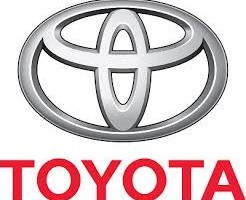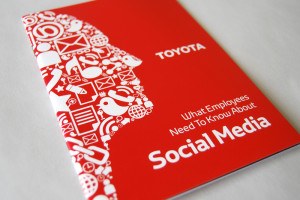Toyota & Social Media Monitoring

Toyota leverages social media intelligence to innovate its product development, sales, and marketing.
Toyota, a leading Japanese automotive manufacturer, is widely known for its best-in class manufacturing and supply chain management expertise; through its Toyota Production System, which aims to design out overburden, inconsistency, and waste, the company has pioneered innovative operation practices including Just-In-Time Production and shown how an organization can improve its operation continuously and sustainably. For further innovation and disruption, the leader in manufacturing and supply chain management recently started to put its attention to social media intelligence. Toyota’s effort to leverage social media intelligence is led by the firm’s Social Media Intelligence Center, a joint venture of Corporate Communications, Information Systems, Marketing and Customer Relations, and powered by Customer 360 Insights, a proprietary system developed by the Corporate’s Information System group.
The Toyota’s Social Media Intelligence Center analyzes social media commentary, which contains targeted keywords such as “Lexus,” “decide,” “buy,” and “BMW ” to learn what customers think of specific vehicles, identify quality problems, and increase the accuracy of sales prediction. One notable area among Toyota’s value chains where such social media analysis makes huge impact is the firm’s sales and marketing effort. Predictive analytics and sentiment analysis conducted based on the social media data can allow Toyota’s sales reps and dealers to make more informed decisions about how to spend marketing budget or incentive money. Segmenting customers who expressed interest in purchasing a car from social media data, analyzing the frequency of dealership visits via a customer’s foursquare check-ins, and understanding his dealership experience, for example, lead Toyota sales reps to focus on potential customers who have higher level of readiness to buy. Moreover, the analysis of free-form text helps the firm to broaden their understanding on customer perception on the firm brand or specific vehicle. The accumulated data from such analysis also allows the firm to have insight on the correlation between actual sales and the sentiment of customers’ commentary in social media or to deepen its understanding on a customer’s process of deciding between Toyota and another make.
” to learn what customers think of specific vehicles, identify quality problems, and increase the accuracy of sales prediction. One notable area among Toyota’s value chains where such social media analysis makes huge impact is the firm’s sales and marketing effort. Predictive analytics and sentiment analysis conducted based on the social media data can allow Toyota’s sales reps and dealers to make more informed decisions about how to spend marketing budget or incentive money. Segmenting customers who expressed interest in purchasing a car from social media data, analyzing the frequency of dealership visits via a customer’s foursquare check-ins, and understanding his dealership experience, for example, lead Toyota sales reps to focus on potential customers who have higher level of readiness to buy. Moreover, the analysis of free-form text helps the firm to broaden their understanding on customer perception on the firm brand or specific vehicle. The accumulated data from such analysis also allows the firm to have insight on the correlation between actual sales and the sentiment of customers’ commentary in social media or to deepen its understanding on a customer’s process of deciding between Toyota and another make.
Toyota initiated its social media monitoring relatively earlier than its peers in the automotive industry and has refined its ability to analyze and leverage  data for several years; however, to maintain its competitive advantage in leveraging social media intelligence, Toyota should continue to develop and improve its platform which helps the company not only to understand who its customers are but also to proactively engage them in a meaningful way. A recently created team in Toyota called Customer 360 is an example that shows how Toyota tried to create such an effective and systematic approach to use data resulted from social media monitoring in creating business impacts. The team aims to give the company a holistic view of its customers by tearing down each team’s individual data silos within the company and uniting data gathered from a customer’s digital lifecycle with data gathered by the firm’s business groups. Toyota’s attention to social media intelligence coupled with its effort to create connection between data and its existing business is a great example of how a company finds captures value from data analytics and comes up with strategies that grow the business through innovative use of technology.
data for several years; however, to maintain its competitive advantage in leveraging social media intelligence, Toyota should continue to develop and improve its platform which helps the company not only to understand who its customers are but also to proactively engage them in a meaningful way. A recently created team in Toyota called Customer 360 is an example that shows how Toyota tried to create such an effective and systematic approach to use data resulted from social media monitoring in creating business impacts. The team aims to give the company a holistic view of its customers by tearing down each team’s individual data silos within the company and uniting data gathered from a customer’s digital lifecycle with data gathered by the firm’s business groups. Toyota’s attention to social media intelligence coupled with its effort to create connection between data and its existing business is a great example of how a company finds captures value from data analytics and comes up with strategies that grow the business through innovative use of technology.



Super interesting! I know big companies are all about monitoring their own social media presence nowadays, whether its running ad campaigns, responding to user comments or doing the necessary quality control against negative PR. With all the recalls driving risky PR in the industry, I can see tremendous value to this for automotive firms. I didn’t imagine an automotive company would be this proactive in monitoring greater industry trends and brand sentiment. I think this can reveal interesting insights about brand loyalty and the impact advertising efforts have on awareness. Hopefully Toyota can better use social data to inform marketing spend and vehicle incentives — I think the challenge will be collecting the right data which correlates to new sales or increased loyalty.